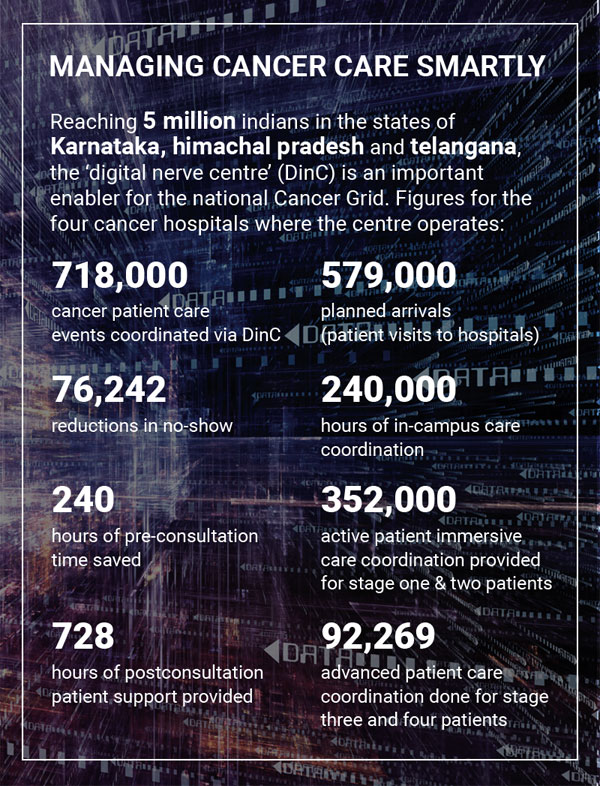The ‘digital nerve centre’ is a trailblazing solution that will have far-reaching impact on how healthcare services are delivered in India
Patients from remote villages in Kolar district of Karnataka, who had little or no access to quality medical consultation, now find that healthcare is just a phone call away. They are the primary beneficiaries of the ‘digital nerve centre’ (DiNC), a technology platform developed about a year ago by Tata Consultancy Services (TCS) and supported by the Tata Trusts.
The Trusts are promoting DiNC to improve access at the lowest rung of India’s health network. The digital platform helps bridge the divide between India’s primary health care system and the underprivileged by connecting far-flung primary health centres with a central medical hub through toll-free numbers.
Government boost
DiNC makes the delivery of treatment more robust by allowing appointment booking and maintaining digitised health records of patients. There are patient care coordinators at certain centres who address non-medical queries and thus help both patients and clinicians save time. DiNC also enables hospitals and treatment centres to collaborate and share knowledge.
The biggest impact is that the DiNC platform makes healthcare more accessible. Aparna Ganesh, who heads the project at the Tata Trusts, explains that people in rural areas who do not access the public health system end up paying more for private care. “The DiNC project uses technology to improve healthcare management and ensure that the patient is connected to the right doctor in time.”
Girish Krishnamurthy, vice-president at TCS and head of the DiNC initiative, says that patient response to the Kolar DiNC has been very positive. “Patients, especially expectant mothers and those suffering from diabetes and cancer, have revealed that the appointment booking and alert service by DiNC has helped them immensely in managing and maintaining their treatment continuity.”
DiNC is currently operating in seven districts in three states — one district in Karnataka, two in Himachal Pradesh and four in Telangana. Mr Krishnamurthy says that these states have roped in TCS “to facilitate primary care transformation as the DiNC platform helps provide the right treatment at the right time through the right medical centre.”
The Tata Trusts are also using the DiNC platform as part of its national cancer care initiative. Says Ms Ganesh, “The DiNC for the National Cancer Grid (NCG) enables the delivery of comprehensive cancer care service to patients by improving access and connecting all the cancer centres on a real-time basis.”

Top centres in the loop
The DiNC platform has been operating for more than a year at four of the top NCG oncological care centres — Tata Medical Center, Kolkata; Adyar Cancer Institute, Chennai; Tata Memorial Hospital, Mumbai; and Regional Cancer Center, Thiruvananthapuram. June 2018 saw the launch of a DiNC at the State Cancer Institute, Assam. According to Mr Krishnamurthy, DiNC will be part of the 19 cancer hospitals and sub-hospitals that are being setup by the Tata Trusts to curtail the growing menace of cancer in the north east. New Delhi’s All India Institute of Medical Sciences (AIIMS) is another adopter of DiNC — it is using the tech platform to manage the 3 million+ patients that visit its 21 out-patient departments every year.
Currently, DiNC reaches out to more than 5 million people at multiple levels of the public health system. “Our goal is to reach 20 million people by 2020,” points out Mr Krishnamurthy.
What’s heartening is that the technology’s biggest impact lies in the primary health care system.
